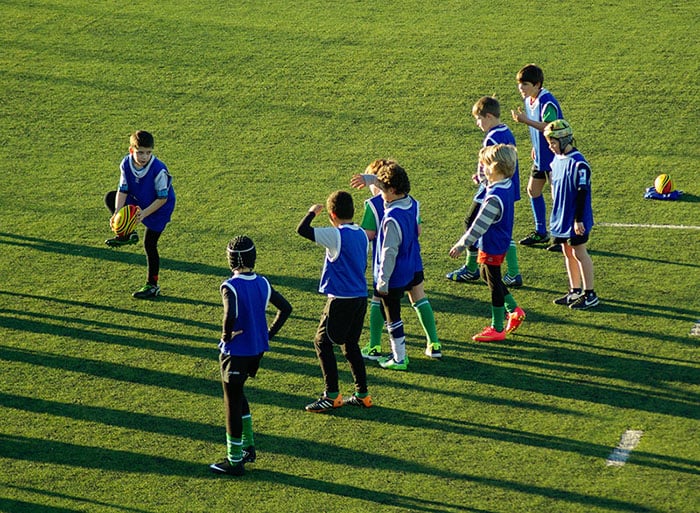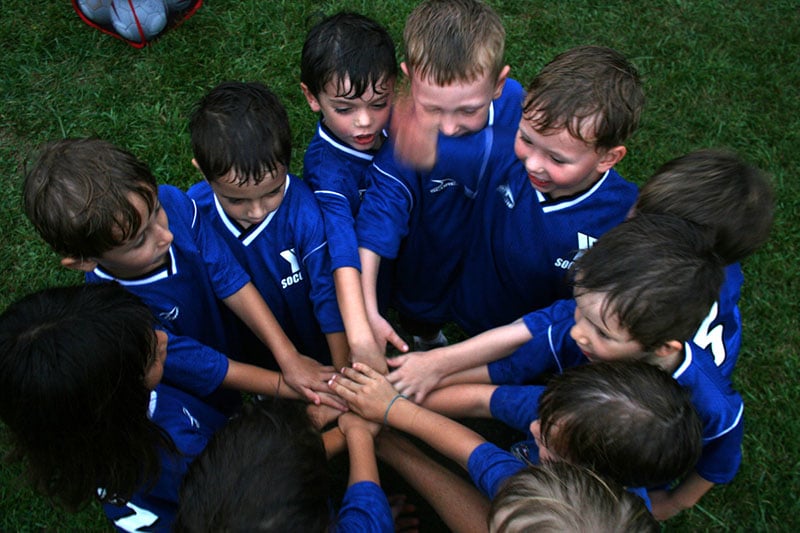Getting kids off the sofa and onto the sports pitch brings a wide variety of physical, mental and social skills which will bode well for them as they reach adulthood and beyond.
And obviously, we would say that. But in order to prove our point, we've compiled no less than 9 reasons why kids should get off the sofa and play some sport.
1. Improve physical health
Forgive me for starting with the obvious, but sport brings physical health benefits to anyone who takes to the field – and children are no different.
According to to Public Health England's 2014/15 child obesity figures, 9.1% of 4-5 year olds are obese, with that figure rising to 19.1% for children aged 10-11.
The importance of getting kids out playing sport first starts with the physical advantages, and given the figures – it's clearly important to get them involved as young as possible.
You can never just expect their experiences in PE to fuel a want for more sport - it needs to be supported with recreational sport.
Rather than reminiscing about how you never wasted so much time in-front of the TV as a child, ensure your kids are enthused and excited by sport, and all the health benefits will immediately follow.
2. Lifelong well-being
The older a child gets involved in sport, the less-likely they are to consider it an important part of their lives, and the less chance you'll have of securing their interest as they progress into adulthood.
Sport is a great avenue for promoting a healthy lifestyle, and this feeds into a number of other areas of life. For example, those who consistently play sport are more likely to be aware of the healthy food choices they need to make in order to perform.
As an adult, your position as a positive role-model is vital. Make healthy lifestyle choices and promote regular exercise as a parent, and your children are likely to follow suit.
The physical advantages to playing sport are well-documented, but that's not the only boost you'll get to your well-being by getting out and about. A fit and active body has been proven to translate into a fit and active mind. Reduce stress and increase mental health by getting you kids active.
All these factors roll together to help children build a healthy state of well-being that will last them a lifetime.
3. Develop social skills
Developing social skills is another huge part of parenting, and one that again needs to be developed at a young age if the benefits are to be reaped in the future.
One of the best ways to develop a child's social skills is through getting involved in sport, particularly team-based activities. Communicating new ideas, listening to others as part of a group, and using communication to solve problems by working as a team – just a few of the things children learn from getting involved in sport.

On top of that, a child can grow into the first leadership role of their lives by taking a captains role in a sports team. Again, exposing children to environments where communication is key pay-offs big time in the future. Their conversational skills and ability to play a role in a team or as a leader will come in handy as an adult in the future.
4. Build self-esteem and confidence
Moving slightly back to the development of personal, social-based skills, self-esteem and confidence are two further areas where children can benefit through the means of sport.
Sport is a great way to boost a child's confidence through encouragement and compliments, highlighting areas where they are doing well and rewarding them for showing endeavour and improvement in these areas. As a coach and/or parent, children look up to you as a authority figure. Take that responsibility and use it to grow your youth players.
Aside from a coach and parent's encouragement, there is no greater feeling as a child than playing a major role in some sporting success. The respect earned from your teammates is huge, and feeds directly into other subjects we'll touch on throughout this guide. Plus, it can also give your child a major boost to their self-esteem.
Similarly, children can learn to take constructive criticism from coaches, and accepting and applying it can benefit them in the long-term. Advice and tips for development should be treated as motivational, and when players do show signs of acting on those words of advice, coaches should move to reward them for taking the initial pointers on-board.
5. It could even go somewhere...
As a child, it was always my dream to step out at Lords as an opening batsman. Unfortunately, my dreams were scuppered by one tiny barrier – talent. Still, using that dream as a motivational tool was great for feeding my enthusiasm for sport, and for some the dream does come true.
Competition for places on the professional sporting ladder is fierce, and it probably isn't wise to start convincing your child that they're the next Lionel Messi or Dan Carter. But growing their love for sport by watching how the elite go about it is great for aspirational reasons, and will ensure they stick around in sport for the long-term.
Help your child look at sport from a positive frame of mind, looking to emulate their favourite sportsmen and women out on the field – rather than it being a chore they don't enjoy. It'll fuel their willingness to work, improve and succeed.
You never know, it could even go somewhere.
6. Invigorate friendly competition
All these points we've raised on using sport as a motivational tool for improving skills, boosting confidence and making sport a love rather than a chore link back to one central pressure point that applies to sport – it's intrinsically competitive nature.
Recreational sport is great for meeting new people and enjoying a leisurely romp around a playing field, but many of the other sporting benefits are only possible from a (healthy) competitive environment.
In a bonafide league that has winners and losers, the motivational, team-orientated side of sport is ramped up even further.
Whilst it's always horrid to see an over-enthusiastic parent at the side of the pitch, breeding a competitive-edge in your child can be honed into a benefit. They'll need to really focus their mind to a task, work together with their teammates to overcome issues, and show dedication and commitment to improve. All thanks that burning desire to win.
7. Learn valuable life-lessons
We've touched on this point a little earlier, but sport is great for instilling an attitude in children that success and rewards comes off the back of hard work.
Using sport to harness the learning of these life lessons bodes well for the future. Knowing that nothing comes for free and success is better when you've worked hard to achieve it is something they can carry forward into education and employment.
As with all a number of the advantage we've outlined, kids can learn a number of life lessons from their sporting activities. They can then use that experience and adopt lessons learned in other aspects of life.
8. Make new friends
As an extension of those social skills, getting children out into new environments is a great way to helping them make friends. Engaging your child in sport can then lead to healthy social-life benefits, meeting new people that could develop into life-long friends.

Plus, for kids it's great to feel involved, contribute to a team atmosphere, and part of something good. Nobody likes to see their children locked away in their room when they could be out socialising with friends, and often they just need a nudge and some encouragement to come out of their skin.
Sport for youngsters is as enjoyable in its social aspects as it is for its physical ones – and you can only do that by going out and joining a club.
9. Breed academic success
Ultimately, we all want what's best for our children, and sometimes that could translate into thinking sport is more of a distraction than a benefit.
On the contrary, a number of studies highlight how exercise can have a direct influence on your success at school. One example comes from academics at University of South Carolina and Pennnsylvania State University in 2013. They found that taking part in team sports as an extracurricular activity has a consistent and significant effect on student's grades – including a higher probability of them progressing to higher education.
And it makes sense too. Sport is known to give you more energy throughout the day, helping to think clearer and be more creative. It sharpens focus, enhances your mood and can even improve your memory.
Basically, sport is one the key ingredients your child needs to stay physically and mentally healthy, which has a direct influence on how they perform both at school – and as an adult.
An absolute no-brainer.
More top draw coaching content from Pitchero
Need more advice on how to get the best out of your team? Head to our blogs on popular coaching styles plus the importance of teamwork wherever you are in sport.
